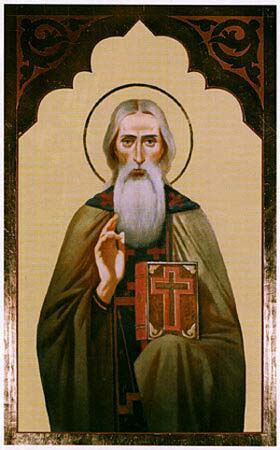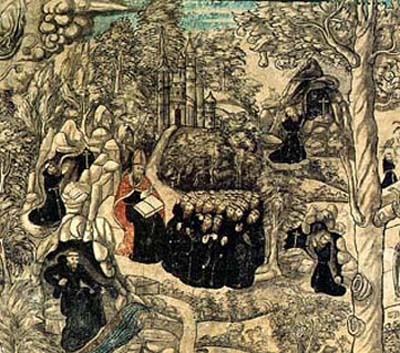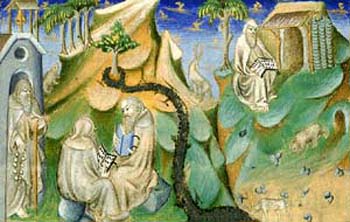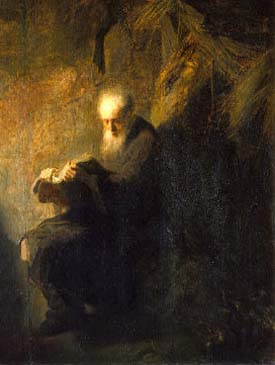 |
The Saint of the Day
St. Macarius of Alexandria – January 2
Prof. Plinio Corrêa de Oliveira
Biographical selection:
Died c. 394. St. Macarius was a successful merchant in Alexandria, Egypt, who was converted to the Catholic Faith and baptized. In about 335 he became a monk in the Thebaid, Upper Egypt, and spent the remaining years of his life as a hermit in penance and contemplation. He was known for his great austerities and many miracles.

St. Macarius, hermit
|
He was banished for a time to an island in the Nile during the Arian persecution by Lucius, the Arian patriarch of Jerusalem, but was later allowed to return. Marcarius wrote a rule for the monastery at Nitria named after him. This rule was later used by St. Jerome for his eremitic life.
In that time, many monks were manifesting the desire to abandon the desert solitude and dedicate themselves to working for souls in the cities. St. Macarius wrote the following story for them.
There was a barber in a small town who charged three coins for each shave. In this way, at the end of a day’s work, he had earned enough money to satisfy his daily needs and still save a small amount for the future. He heard, however, that in a large city nearby the price of a shave was much higher. After some consideration, he decided that it would be a great advantage to abandon his clientele, go to that city, and earn a larger profit with less work.
So, he sold what he had and established himself in the nearby city. Indeed, at the end of the first day he had received a large amount of money. He went to the market to buy what he needed, but realized that the goods were so expensive that after shopping, no money was left in his pocket. With this he recognized his mistake and returned to his native town to continue his work and save for his old age.
St. Macarius concluded his story affirming that the monks should be satisfied with the small fruits obtained in solitude. It is better to stay on the path of their own sanctification in the desert rather than try to save many souls in the city, for with its continuous diversions and dispersions they would lose their spirit of recollection.
Comments of Prof. Plinio:
You see that St. Macarius was facing a general desire on the part of monks to abandon the solitude of the desert in order to make apostolate in the city. These monks alleged that they could save many more souls there than by remaining in the desert.

Thebaid hermits - Fresco, 16th c., anonymous, Colonial Mexican
|
St. Macarius then told them a story with the metaphor of the barber who had a larger profit in the city but also had to pay much more for everything he needed. He concluded that to make an active apostolate in the city can have more apparent fruits than a life of solitude, but the costs are much higher. Why? Because in the life of society sanctification is more difficult to attain; it is more difficult to save one’s soul there than in the solitude of the desert.
The best thing in life is not for one to deal with many persons, talk all the time, and be agitated and excited. The best thing is to live a life of reflection, meditation, and prayer. It is to unite one’s soul to God. Therefore, those who receive the vocation to live a life of solitude received more from God than those who are called to act and fight in the midst of men. This thinking is always true, but it is especially opportune to consider today.
Modern man was prepared by the Secret Forces to not understand solitude, reflection, and meditation. You can observe the lifestyle of most persons around you and see that the essence of their life is to be in contact with others. When they are out, they meet others at work and entertainments, and even in church. They are always anxious to hear the latest gossip, pass on news and transmit their impressions, always trying to create an impression on others. Then they return home, where there is still the telephone, radio, and television, or more conversation.

Hermits in a landscape. From left to right, a hermit praying, one hermit instructing another, a hermit meditating on Scriptures - British Library, London
|
If you would ask one of these persons how long he remained alone and quiet during the day, the answer will be almost no time at all. When modern men read a newspaper, they do not reflect upon what they read. Sometimes you will find persons lying around in chairs. If you pay attention, you will see that they are not thinking about anything in particular, just staring off into space. They are just catching their breaths so that they can continue their agitated lives.
At times they are recalling some unrestrained sensations they had experienced, but very rarely do they make a continuous, structured, and ordered analysis to seek the truth or thoroughly understand some matter. This is very rare. The contemporary man has been formed with the horror of recollection.
Now then, the essence of life is not to be in contact with others; according to the teaching of St. Macarius, the essence of life is for a man to isolate himself in order to finely tune his observations, order his thoughts, and analyze everything under the light of the Catholic principles he has learned. These principles constitute his patrimony, the lens through which he analyzes things and reaches conclusions. Some of these deductions will be practical, some merely speculative. They will be moral maxims of life or general rules of philosophy.
I sustain that this is a type of prayer. To consider everything under the light of Catholic doctrine is to elevate one’s mind to God, which is the definition of prayer.

Hermit reading - Adriaen van Ostade, 17th c.
|
The revolutionary man of our days abhors and flees isolation and recollection. He abhors the interior effort it demands to order his thoughts. He avoids it not because he is very busy, but because he does not want to make this effort. He could renounce such an agitated life and abandon the radio, television, and other dispersive distractions. If he would do this and adopt a calm life, he could recover his recollection. But, unfortunately he became addicted to the excitation and constant activity. He became the extreme opposite of St. Macarius.
The lesson of St. Macarius is not for everyone to become a hermit. It is a call to everyone to become recollected, even if he must live among others. He should find a time for recollection and the contemplation of the things of God. Only in this way will he be preparing his road to Heaven.
For those of us who have in our souls some of this revolutionary agitation, I advise two things:
First, to pray to Our Lady through the intercession of St. Macarius for the grace of recollection;
Second, to make an effort to avoid ambiences of excitation and turmoil. Take one hour a day, or even a half-hour and remain alone and quiet, doing nothing, trying to think about the interests of the Church and the glory of God. Silence is the first step for a soul to become profound.

  | | Prof. Plinio Corrêa de Oliveira | |
The Saint of the Day features highlights from the lives of saints based on comments made by the late Prof. Plinio Corrêa de Oliveira. Following the example of St. John Bosco who used to make similar talks for the boys of his College, each evening it was Prof. Plinio’s custom to make a short commentary on the lives of the next day’s saint in a meeting for youth in order to encourage them in the practice of virtue and love for the Catholic Church. TIA thought that its readers could profit from these valuable commentaries.
The texts of both the biographical data and the comments come from personal notes taken by Atila S. Guimarães from 1964 to 1995. Given the fact that the source is a personal notebook, it is possible that at times the biographic notes transcribed here will not rigorously follow the original text read by Prof. Plinio. The commentaries have also been adapted and translated for TIA’s site.

|
Saint of the Day | Home | Books | CDs | Search | Contact Us | Donate

© 2002- Tradition in Action, Inc. All Rights Reserved
|
 |
|